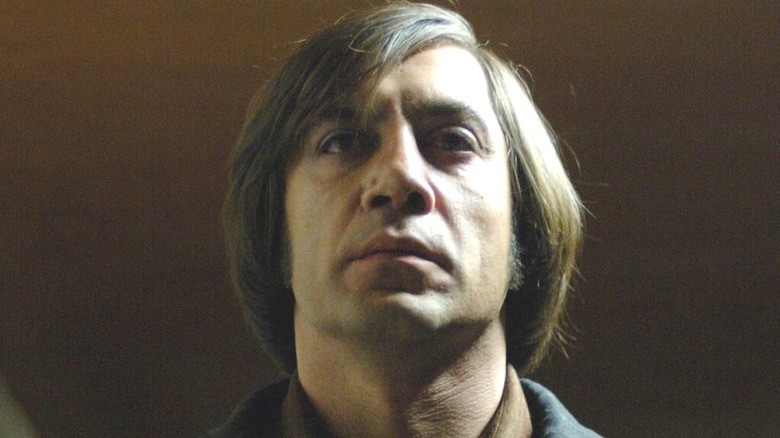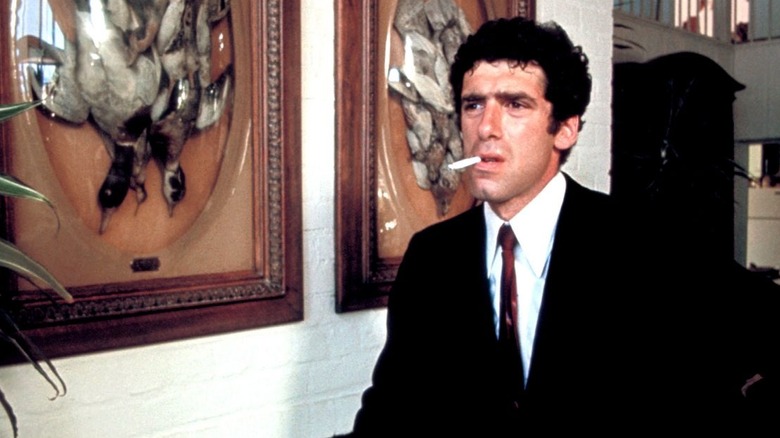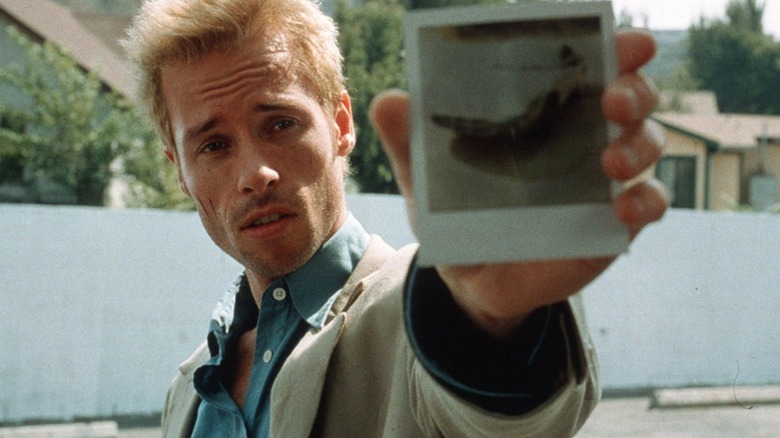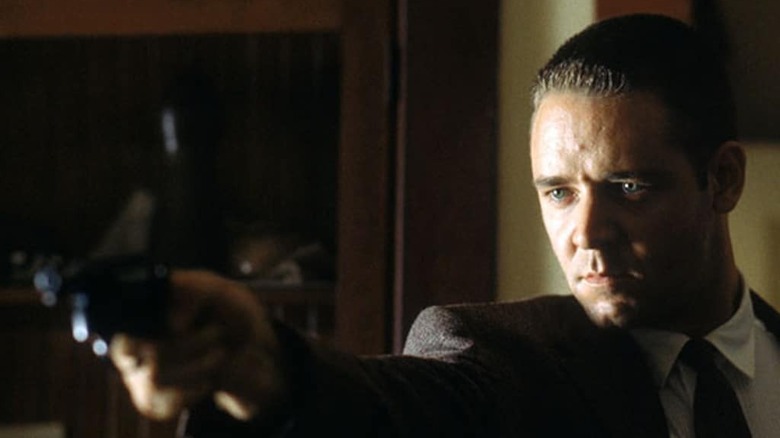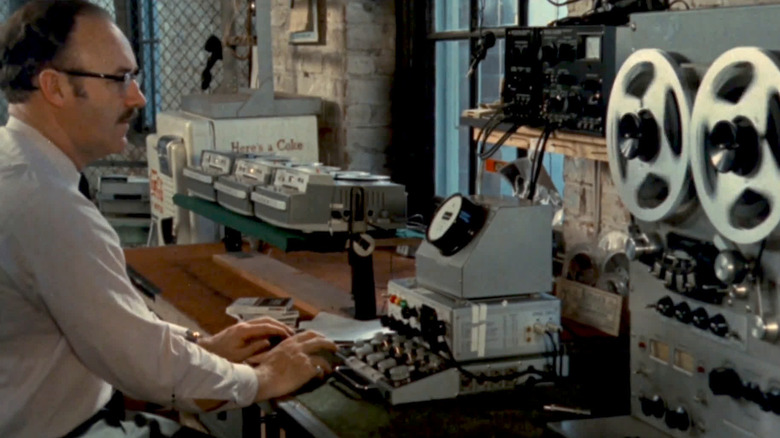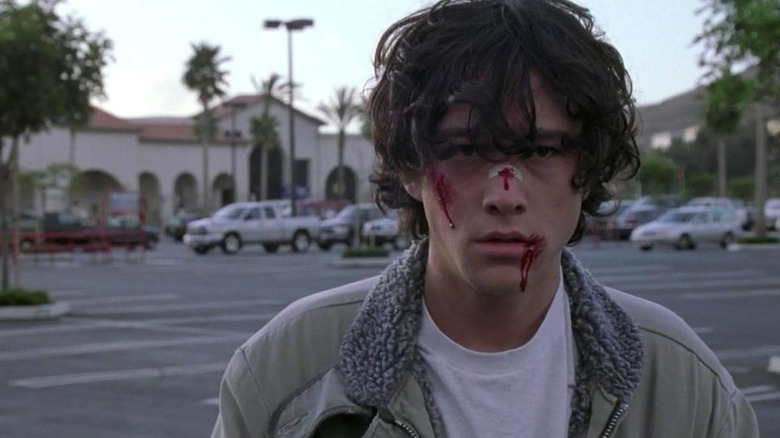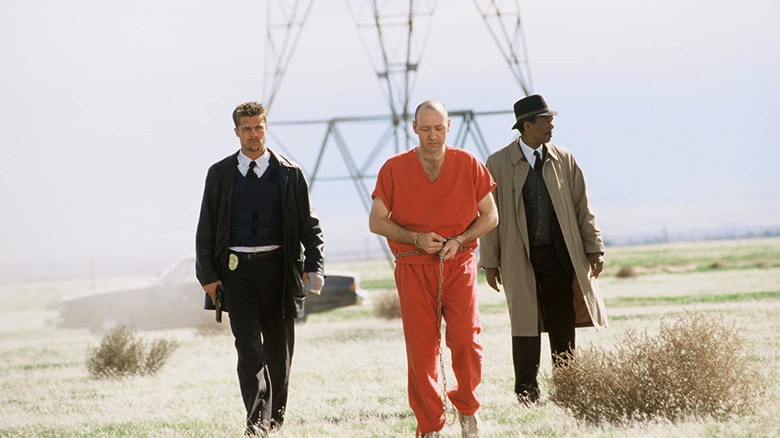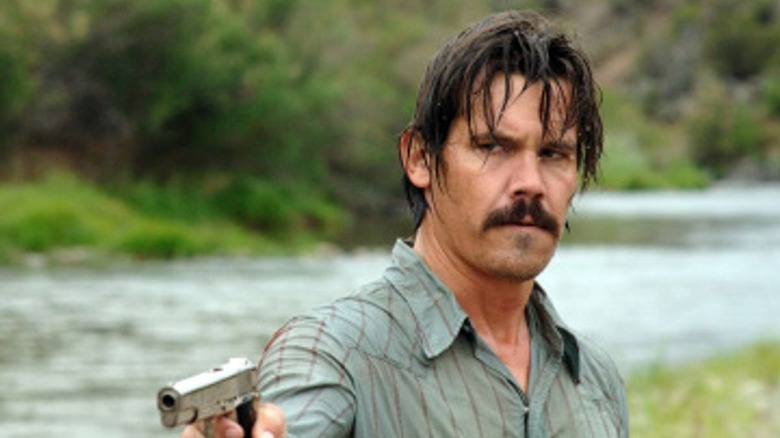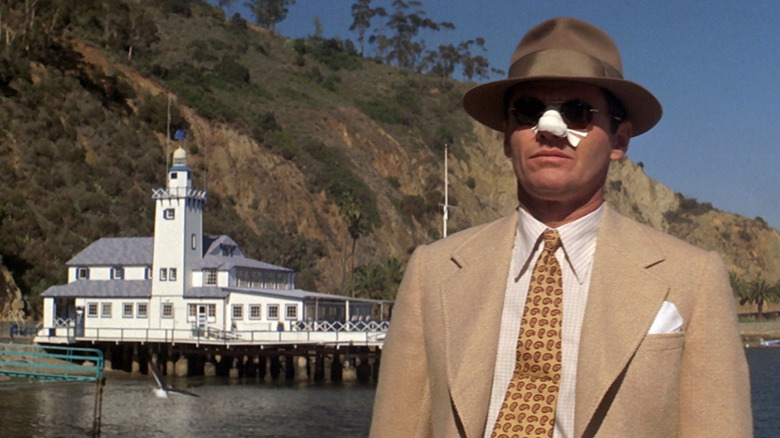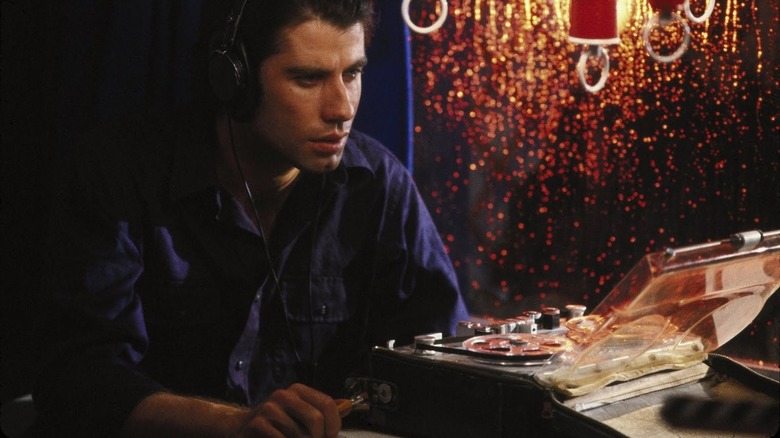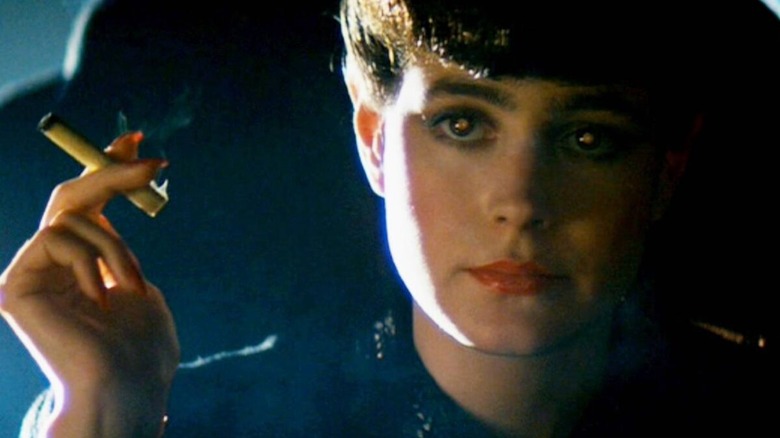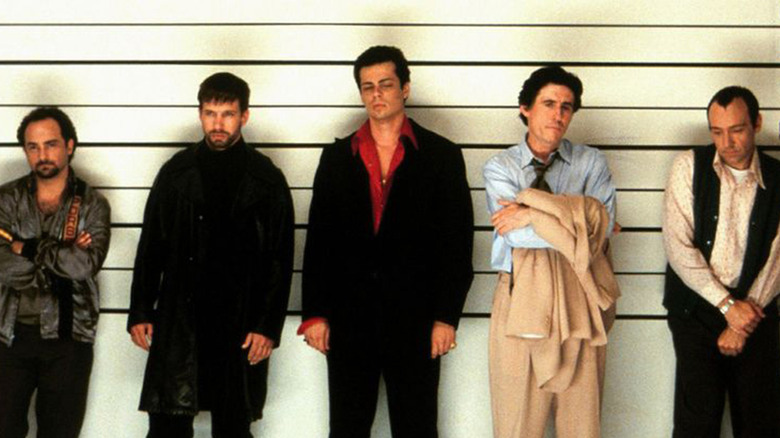The 12 Best Neo-Noir Films Ranked
The noir genre first became popular in the 1940s thanks to the success of early hard-boiled detective cinema. Inspired by the dime store novels filled with mysterious private eyes, femme fatales, and illicit schemes involving deceit and murder, these films provided elevated entertainment for a mass audience. John Huston's 1941 classic "The Maltese Falcon" was one of the earliest examples of the best the noir genre could be.
Neo-noir cinema emerged in the '60s as a response to these early successes. These films were both visually and morally grey; instead of wrapping their stories up neatly in the style of an old-fashioned detective story, they hinted at themes of isolation, loneliness, and social disparity amidst a cruel world. The noir influence was particularly strong on New Hollywood and international cinema, and continues to inspire filmmakers to this day.
Neo-noir cinema is a tough genre to label, as while the elements of these classic stories are present, many neo-noirs also intersect with other genres, including westerns, action-thrillers, science fiction, and satire. With that in mind, here are the 12 greatest neo-noir films ever made, ranked.
12. The Long Goodbye
Robert Altman reimagined the novels of Raymond Chandler, which were mostly published during the '40s, in the context of 1973, capturing the comedic side of the noir private eye in the process. Altman is a master of tone; the events of "The Long Goodbye" are lurid and often disturbing, but as Chandler's famous detective Philip Marlowe, Elliot Gould finds an exasperated side to the character that is hilarious. Between his playful cats and light-hearted banter with his beautiful neighbors, Marlowe is hardly a traditional private eye. It's one of Gould's all-time greatest performances.
Marlowe receives a surprising visit from his old friend Terry Lennox (Jim Bouton), who enlists his help traveling to the Mexican border. Thinking nothing of it, Marlowe is later interrogated by detectives who accuse Terry of murder. Marlowe questions the validity of the accusations and decides to look into the case himself, leading to a series of misadventures involving pretentious authors, drug addicts, and local gangsters.
11. Memento
Christopher Nolan's second feature film, "Memento," is cleverly constructed. The film is told in reverse chronological order, as its main character, Leonard Shelby (Guy Pearce), has a psychological condition that leaves him unable to form new memories. Intermixed with black-and-white flashbacks that depict key details of his life, Leonard's investigation proceeds backwards until the film reaches the moment when the big crime is committed. Nolan is renowned for his complex narratives and shocking plot twists, and "Memento" holds up on repeated viewings.
Leonard looks to solve his wife's murder, and is only able to remember clues by tattooing them on his body. Pearce makes Leonard an emotionally engaging character; he's suffered a tremendous loss, and he's unable to trust anyone as he copes. Nolan doesn't deserve the reputation that he's earned for being humorless, as there are comedic elements to "Memento;" it's funny to see Leonard forced to reassess his location as he's being chased, and his contact, Teddy Gammell (Joe Pantoliano), is a fun side character. Although Nolan would go on to craft large, expensive spectacles, "Memento" proves that his ingenuity still flourishes when he's working with a lower budget.
10. L.A. Confidential
Nostalgia for classic Hollywood mysteries remains strong, but not every work of throwback filmmaking is well-handled. There's a reason why some genres fade, and modern films need to acknowledge that times have changed. "L.A. Confidential" avoids these concerns with its clever reimagining of 1950s Hollywood and detective stories; even though its style recalls classic noir, it acknowledges the genre's cliches, and addresses more themes like police brutality.
"L.A. Confidential" follows three very different cops with big personalities. Bud White (Russell Crowe) is a rough and violent menace, Ed Exley (Guy Pearce) is a geeky rule-follower, and Jack Vincennes (Kevin Spacey) is charismatic and well-connected in Hollywood. A series of murders unites the three officers when they discover that the LAPD is helping to cover up a sex scandal. It's fun to see each character's different method of questioning suspects, and they have fun banter throughout. Kim Basinger's Lynn Bracken is a much more complex femme fatale character than classic '50s stereotypes, too, and her hit-and-miss romance with Bud has real emotional weight.
9. The Conversation
The rise of the "New Hollywood" generation in the 1970s coincided with a period of political uncertainty and increased anxiety over surveillance. The assassinations of John F. Kennedy, Bobby Kennedy, Martin Luther King Jr., and Malcolm X, coupled with the lies surrounding the Vietnam War, led to a state of public paranoia during which American citizens questioned the values of a nation they no longer recognized. While it was an understandably difficult period in national history, filmmakers of the era responded through neo-noir stories that tackled the issues on everyone's minds. 1974's "The Conversation" was released just as the Watergate scandal was breaking, and terrified viewers with its depiction of government spies.
Francis Ford Coppola's masterwork follows the independent privacy researcher Harry Caul (Gene Hackman), who meticulously built his life around avoiding detection. Harry discovers that he has a recording that could be linked to a government-related assassination and questions what his next steps could be; he feels obligated to turn over information that could be critical, yet is terrified that his seclusion will end if he becomes involved. His paranoia increases when the mysterious Martin Stett (Harrison Ford) pursues him; it's unusual to see the charismatic Ford in a villainous role.
While "The Conversation" is a work of political commentary, it's also gripping as a thriller. Harry becomes increasingly sympathetic as his sense of security vanishes, and his idiosyncratic safety precautions prove to be justified in the face of an actual conspiracy.
8. Brick
"Brick" took the hallmarks of hard-boiled detective stories and placed them in an unusual environment: a suburban Los Angeles high school. All of the elements of 1940s classics are reinvented to fit the culture of adolescence, but Rian Johnson's directorial debut is not a spoof. The mystery itself is intense and gripping, and it's actually more heartbreaking to see the younger characters forced to deal with the concerns of an adult genre.
Brendan Frye (Joseph Gordon-Levitt) is a social outcast with a knack for solving problems. He receives an emotional phone call from his ex-girlfriend Emily Kostich (Emilie de Ravin), who tells him that she's in danger and warns him to be wary of a "bad brick." When Emily is found murdered, Brendan decides to look into the names "Tug" and "The Pin," which she mentioned during their last conversation, leading him to a drug syndicate tied to the school's top dealer (Lukas Haas).
It's interesting to see how Johnson reinterprets different noir character archetypes. Brendan's sidekick is the geeky Brain (Matt O'Leary), who keeps track of the schools' various clubs and helps research the case. The school's assistant vice principal (Richard Roundtree) fills the overbearing police lieutenant role. Instead of a wealthy upper class, "Brick" uses the school's theater club, and the enigmatic actress Laura Dannon (Nora Zehetner) fulfills the femme fatale role. The details are spot on, including a steely voice over from Brendan, while the low budget only adds to the sense of grittiness.
7. Se7en
David Fincher's "Se7en" is a mystery that's so haunting that it often descends into straight up horror territory. While it's not a traditional slasher film, the grizzly murder investigation looks at the bleakest side of humanity through a case that pushes its heroes to their emotional breaking points. Fincher is a master of getting in the mind of tormented characters, and with "Se7en" he explores the psychology of both good men that do evil and a purely villainous man with no redeeming features.
Veteran police investigator William Somerset (Morgan Freeman) is assigned to work with the novice cop David Mills (Brad Pitt) in an investigation into a series of sadistic murders. The killer bases each crime on one of the seven deadly sins, teasing the detectives with clues. Somerset is about to retire and struggles with the severity of the case; Mills sees it as a chance to further his career. Somerset learns that Mills' wife Tracy (Gweynth Paltrow) is pregnant, and he warns his new partner about the personal costs inherent to their line of work.
The result is one of Freeman's most complex performances. He's deeply cynical, yet shows his compassionate side as he bonds with Tracy and offers her guidance. Pitt plays up Mills' hot-headed tendency, but he's still a knowledgeable investigator who is able to piece together the killer's clues. But it's Somerset who delivers the chilling final line: "Ernest Hemingway once wrote 'The world is a fine place and worth fighting for.' I agree with the second part."
6. No Country for Old Men
The Coen Brothers are masters of reinterpreting familiar genres in order to make them feel fresh again, and with "No Country for Old Men" they took on both the neo-noir and the western. An adaptation of the acclaimed novel by Cormac McCarthy, "No Country for Old Men" examines the futility at the heart of the American west, showing how greed breeds a cyclical nature of violence that is only destined to escalate. While the Coens are known for their quirky humor and idiosyncratic characters, "No Country for Old Men" is their most grim and disturbing work to date, although it does feature one of the greatest film villains of all time in the fearsome assassin Anton Chigurh (Javier Bardem).
Chigurh travels across small towns in Texas in search of a bag of stolen cash, ruthlessly murdering and tormenting the local law enforcement officers who attempt to stop him. Bardem is cold, showing no hint of remorse as he efficiently dispatches with his victims. Chigurh discovers that the money he's been contracted to find has been discovered by Llewelyn Moss (Josh Brolin). Llewelyn considers returning the cash after he's confronted by his wife Carla (Kelly MacDonald), but Chigurh has already massacred the other survivors. The local sheriff Ed Tom Bell (Tommy Lee Jones) tries to put the pieces together; calling back to the film's title, the older man can't understand the younger generation's brutality.
5. Chinatown
"Chinatown" had a notoriously troubled production that nonetheless produced a classic that endures to this day. As meticulously chronicled by author Sam Wasson in "The Big Goodbye," the film united four signature creative forces of the New Hollywood generation during moments of personal hardship. Director Roman Polanski was coping with the recent murder of his wife Sharon Tate, actor Jack Nicholson was combatting the pressure of his new stardom, producer Robert Evans was trying to make elevated films on a studio budget, and screenwriter Robert Towne tormented himself researching the California government's corrupt handling of the Los Angeles water system.
"Chinatown" follows an investigation by private eye Jake Gittes (Jack Nicholson) into Hollis Mulwray (Darrell Zwerling), the chief engineer at the Los Angeles Department of Water and Power. Mulrawy's wife, Evelyn Cross Mulwray (Faye Dunaway), courts Jake's expertise as he investigates her wealthy father, Noah Cross (John Huston), a powerful land baron. Jake is met with criminals attempting to silence him, but is simultaneously fascinated with both the case and Evelyn. He suspects that there's a strange connection between Evelyn, her father, and her young daughter Katherine (Belinda Palmer), but the truth isn't revealed until the film's shocking twist ending.
The final moments of "Chinatown" are among the grimmest in neo-noir history. Towne's screenplay is often cited as one of the greatest ever written, and Nicholson is engagingly cynical in one of his definitive screen roles.
4. Blow Out
Hitchcock was known as the "Master of Suspense," and his extensive filmography inspired many imitators who attempted to capture his signature filmmaking techniques. Few among these directors were able to develop a style that both paid homage to Hitchcock and incorporated new ideas — Brian De Palma was the exception to this rule. De Palma was one of the cornerstone figures of New Hollywood in the 1970s, and reinvented Hitchcock's meticulous sense of stylish suspense by infusing it with elements borrowed from Italian giallos, political thrillers, exploitation films, and psychological mysteries.
De Palma's masterpiece is the 1981 neo-noir classic "Blow Out." While "Blow Out" wasn't initially a box office success, it gained critical appreciation over the years and developed a cult audience. "Blow Out" follows the film sound technician Jack Terry (John Travolta), who works on cheap, low-quality horror films. One night, Terry ends up accidentally recording a fateful car accident that claims the life of a driver and leaves behind a sole survivor, Sally Bedina (Nancy Allen). Using his sound editing skills, Terry mines the evidence and delves deeper into the crash, which he now suspects to be part of a larger conspiracy. He grows close to Sally, and learns that she is the mistress to the corrupt Governor George McRyan.
Terry's filmmaking experience makes him unique among noir heroes, and De Palma uses the sordid movie sets to satirize the film industry. Just watch out: The ending of "Blow Out" is among the most tragic in film history.
3. First Reformed
It's fascinating when neo-noir films incorporate religion into their narratives. A noir mystery itself calls on the viewer to engage with the plot, but some questions loom larger than any one story beat. Discussions of fate, mortality, and spirituality are deeply personal, and not every filmmaker is mature enough to handle the weighty topics. However, screenwriter Paul Schrader is one of the signature writers of his generation, and included compelling considerations of faith in his scripts for "Taxi Driver," "Raging Bull," and "The Last Temptation of Christ."
Schrader has had a hit-and-miss record as a director, but he delivered the finest film of his career with the 2018 neo-noir masterpiece "First Reformed." Reimagining the visuals and storyline of "Taxi Driver" for a modern age, Schrader uses a crime subplot to question the ways in which religious fundamentalism is justified in the 21st century. He also looks at issues like environmental collapse and modern terrorism.
Ethan Hawke delivers his single greatest performance as the clinically depressed Pastor Ernst Toller. Toller is grieving over the recent death of his son in the Iraq War, and has taken to heavy drinking. He's sought out by Mary Mensana (Amanda Seyfried), who informs him that her husband is involved in a radical activist group that's planning a series of suicide bombings. The vulnerable Toller finds himself drawn to the radical beliefs, and considers taking a drastic course of action.
2. Blade Runner
The science fiction and neo-noir genres go hand in hand, as a visceral dystopian setting has the perfect gloomy atmosphere for a neo-noir crime mystery. Not only does the inclusion of sci-fi force filmmakers to be more creative in their worldbuilding, but it allows the viewer to question the advancements of technology while piecing together clues. "Blade Runner" is one of the greatest science fiction films ever made, and its themes of consciousness, self-worth, and the value of life itself are just as relevant now as they were in 1982.
"Blade Runner" takes place in a version of 2019 where humanoid robots known as "replicants" work in factories and colonies across the planet. Replicants are designed to be terminated after a set period of time, and the government enlists assassins known as "Blade Runners" to hunt down and eliminate any replicants that seek a longer life. Detective Rick Deckard (Harrison Ford) is tasked with tracking down the cult-like figure Roy Batty (Rutger Hauer), and questions a mysterious replicant named Rachael (Sean Young). Deckard and Rachael begin to fall in love; in a bit of thematic brilliance, an emotionless human learns how to feel through a romance with an artificial being.
"Blade Runner" is starkly beautiful, featuring groundbreaking visual effects and a haunting score by Vangelis. Fans have analyzed the film for decades, with some theories suggesting that Deckard himself may be a replicant. Several alternate cuts of the film exist that hint at different interpretations.
1. The Usual Suspects
"The Usual Suspects" is one of the most geniously crafted noirs ever made, and the rare mystery that leaves the audience guessing until the very end. Christopher McQuarrie's Academy-Award winning screenplay uses an unreliable narrator to explore a seemingly simple heist story from an engaging perspective; there are hallmarks of classics like Akira Kurosowa's "Rashomon" and Stanley Kubrick's "The Killing" here, but McQuarrie's script also sits nicely alongside the other gritty, independent crime thrillers of the 1990s.
The film follows police officer Dave Kujan (Chazz Palminteri) as he investigates the robbery of a $20 million shipment of cocaine on a dock in San Pedro Bay. The only witness to the crime was the coward Verbal Kint (Kevin Spacey), who Kujan presses for details on the origins of the heist. Verbal was part of a five-man lineup that included the career criminals Dean Keaton (Gabriel Byrne), Fred Fenster (Benicio del Toro), Todd Hockney (Kevin Pollock), and Michael McManus (Stephen Baldwin). Verbal recounts his involvement in the crime, hinting at the enigmatic villain known only as "Keyser Soze" that's been manipulating the events from the beginning.
The mythology of Soze gives "The Usual Suspects" a compelling mystery, but McQuarrie also incorporates dark humor into the dialogue. The performances are terrific, with the late great Pete Postlethwaite appearing as the shady lawyer Kobayashi. From a modern perspective, it can be hard to appreciate "The Usual Suspects" given the real-life allegations against director Bryan Singer and Kevin Spacey, but it's nonetheless a neo-noir masterpiece.
